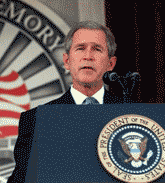
With Iraq dominating the debate in Congress and the Bush administration both publicly and anonymously pressing the case that Iran is equipping insurgents, one could be forgiven for forgetting about a little place called Afghanistan. Before the war on terror became a boundless, amorphous struggle, one that is now destined to be measured not in years but in generations, this formed the conflict’s central front. But, after spending the past few years focusing almost exclusively on Iraq, it was to this neglected front—where the Taliban is again on the rise, warlords reign, and the heroin trade is flourishing—that President Bush returned, rhetorically at least, today.
For his address, during which he announced a renewed offensive that is to include a troop escalation, Bush chose a decidedly friendly audience. Gathered in the lavish ballroom of Washington’s Mayflower Hotel, amidst a swarm of Secret Service agents, the invite-only crowd was handpicked by the American Enterprise Institute, the neoconservative think tank that has sent more than 20 of its scholars to the ranks of the Bush administration. Lest we forget, it was some of these same neocon luminaries—Richard Perle, David Wurmser, Michael Rubin, and, of course, the vice president himself—that helped to propel the U.S. into war with Iraq over the country’s still unaccounted for stockpiles of WMDs.
But this morning talk of Iraq was nearly absent from the president’s speech, though he did seize the opportunity to knock the anti-troop-surge resolution that’s currently being debated in the House. Noting that the Senate confirmed General David Petraeus to oversee military operations in Iraq, he said “now, the House is debating a resolution that disapproves of our new strategy. This may become the first time in the history of the United States Congress that it is voted to send a new commander into battle and then voted to oppose his plan that is necessary to succeed in that battle.” (To be clear, the strategy in question is Bush’s.)
But Bush hadn’t come to dwell on Iraq—and he never once mentioned Iran, which he accused yesterday, in vague terms, of arming insurgents. Rather, Bush told his audience that the White House had recently completed a “top-to-bottom” review of U.S. strategy in Afghanistan. Much like the president’s recently articulated plan for Iraq, this strategy will also call for a surge of manpower and money ($11.8 billion over the next two years if the president gets his way). Promising a “relentless” NATO offensive on Taliban and Al Qaeda fighters this spring, the president said his strategy also includes extending the tours of the 3,200 U.S. troops stationed in Afghanistan by another four months. And, he said, “we’ll deploy a replacement force that will sustain this increase for the foreseeable future.” Left unsaid, however, is just how many troops this surge will entail.
Relying on language that has become a hallmark of his policy addresses on terrorism and an inside joke among his critics—“we’ve got to fight the terrorists overseas so we don’t have to fight them at home,” backing off will “embolden” the enemy—Bush conceded setbacks in Afghanistan. The past year, he acknowledged, has been the bloodiest since the Taliban fell. And, while the conflict escalated, so did the cultivation of the poppy crop (from which heroin is derived). By some estimates, close to half of Afghanistan’s gross domestic product comes from the poppy, and, in turn, the drug trade. “I’ve made my concerns to President [Hamid] Karzai pretty clear—not pretty clear, very clear,” the president said. “In order for him to gain the confidence of his people and the confidence of the world, he’s got to do something about it.” The president’s remarks also suggest that the United States will lean heavily on Pakistani president Pervez Musharraf, who the administration expects to crack down on Al Qaeda elements that take refuge in the frontier regions of his country. “This is wild country,” Bush said. “This is wilder than the wild West. And these folks hide and recruit and launch attacks.” This pressure on Pakistan will come with significant U.S. assistance in both funding and sophisticated military equipment “to help the Pakistani forces locate the terrorists attempting to cross the border” into Afghanistan, Bush said.
Watching Bush’s address, one couldn’t help but notice that contained in the subtext of his speech was a not so subtle entreaty to America’s NATO allies. The message, essentially: get on board. “When there is a need, when our commanders on the ground say to our respective countries ‘we need additional help,’ our NATO countries must provide it in order to be successful in this mission,” he said. “As well, allies must lift restrictions on the forces they do provide so NATO commanders have the flexibility they need to defeat the enemy wherever the enemy may make a stand.” He then added, “The alliance was founded on this principle: An attack on one is an attack on all. That principle holds true whether the attack is on the home soil of a NATO nation or on allied forces deployed on a NATO mission abroad.”
The administration’s renewed emphasis on Afghanistan, coming out of the blue after these long years of Iraq tunnel vision, leaves the president’s critics an ample opening to stage their own attack. And the Democratic National Committee wasted no time in doing just that, issuing a strongly worded statement accusing the president of trying to “divert attention from the fact that his administration has virtually ignored Afghanistan while escalating the war in Iraq.”
But, back in the Mayflower ballroom, among people of his own ideological bent, the president’s new strategy was warmly received. And perhaps their reassurance is all that he needs.

















